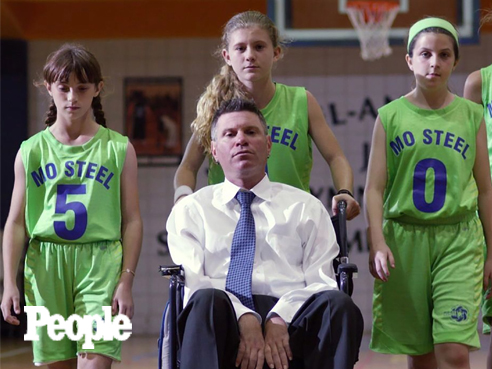AAU Member Jeff Fogel featured in People
10/29/2019
AAU member Jeff Fogel was chosen as a Hero Coach in People Magazine's campaign on coaches who inspire. He coached for the Mo Steel girl's basketball team, as well as Michael-Ann Russel JCC Flag Football team.
'Warrior' with ALS 'Is Not Going to Stop' Coaching Kids — Even Though He Can No Longer Speak
"He showed us that no matter what you are going through, try to remain positive and make the best of it," says one of Jeff Fogel's basketball players
Article originally posted by Diane Herbst on People.com

An athletic and energetic youth sports coach in North Miami Beach, Jeff Fogel was known for his unabashed enthusiasm. But 10 years ago he started to feel twitching in his left arm, which he attributed to throwing a football during flag football practices. Then his arm gave out.
Fogel, now 48, was diagnosed with Amyotrophic Lateral Sclerosis (ALS), commonly known as Lou Gehrig’s disease, a progressive neuromuscular syndrome. It eventually paralyzed him from the neck down and left him unable to breathe or eat on his own. But the disease has not put a stop to his coaching.
“The kids,” he tells PEOPLE, “are my medication.”
For the last year and a half, Fogel has needed to breathe with the help of a ventilator, which prevents him from talking. He mouths instructions during practices and games at the Michael-Ann Russell JCC to his assistant flag football coach, Ariel Fishman, 17, a former player on the AAU basketball team he once coached.
In July, a bout of pneumonia in his left lung landed Fogel in a hospital ICU. Still, he writes in an email that he vows to return to coaching flag football in September.
“I am a warrior,” he says.

Indeed, Fogel has never thought about quitting.
“I am so passionate about coaching the kids,” Fogel tells PEOPLE in an earlier interview. “It keeps me going, it gives me a purpose.”
He answers questions by dramatically mouthing answers to Noah Feldman, director of basketball at the Michael-Ann Russell JCC, who spoke aloud for Fogel.
“I need to stay active due to my disease,” Fogel says, “and I believe that my purpose on this earth and in life is to inspire people.”
As the disease progressed, Fogel was assistant coach for Mo Steel, the JCC’s girls travel basketball team, from 2012 to 2017.
Former players say he may have shown them some basketball moves, but more importantly, he taught them not to let adversity curb one’s ability to live life to the fullest.
Fogel never complained about having ALS or feeling down, says Lindsey Weingard, 16, of Miami. “He always used to say that what’s keeping him going is the team, us girls,” she says. “It made me feel really good.”
“He showed us that no matter what you are going through,” she continues, “try to remain positive and make the best of it.”
Adds Fishman, a former Mo Steel teammate: “The fact that he still came out, and he may be tired, he can’t feel his hands, and then we complain that we’re tired? I just feel we didn’t have the right to do that,” she says. “It’s a type of lesson that I don’t think any coach can teach us.”

These days, the night before a game or practice, Fogel’s 70-year-old mother, Merle, with whom he lives, and one of his three full-time caretakers shower and dress him in the clothes he will wear the next day. In the morning he is fed through the feeding tube he’s relied on since 2014.
Members of the JCC have raised over $500,000 for a trust to pay for the caretakers, which Fogel has needed since 2013, and other ALS-related care, including a specialized van.
“I am grateful,” he says of the community support. “I am blessed to have them in my life.”
Noah Feldman, 36, the JCC basketball director who had Fogel as a camp counselor when he was 11, is amazed by Fogel’s indomitable spirit.
“He is still fighting because of his attitude and the kids,” says Feldman. “I am positive about that.”
“He’s never complained one time, never asked, ‘Why me?’ ” adds Feldman. “He was going to Mo Steel games across the state without the use of his legs and no use of his arms.”

It was Fogel’s idea to start an annual 3-on-3 basketball tournament to raise money to pay the fees for any child who couldn’t afford a sports program at the JCC. In the last three years, the tournament has raised $45,000, and the funds are distributed through the Jeff Fogel Scholarship Fund.
“I am very grateful and I never complain,” Fogel says. “Sometimes I get down like everyone else but then I try to stay positive every day. I have good days and bad days like everyone else.”

Fogel grew up in North Miami Beach and has been affiliated on and off with the JCC since he was 18 as a camp counselor and coach. In the early 2000s, he lived in California and worked as a DJ, returning to South Florida and the JCC about a decade ago to coach.
Around the same time in 2009, Fogel developed the first signs of the disease — twitching and muscle spasms. “I was throwing a football a lot because I was coaching the kids [in football] and I thought I pulled something,” he says. “I didn’t think about it much.”
Shortly after his arm gave out, Fogel was diagnosed with ALS in 2012. Some 30,000 Americans suffer from the disease, which is a progressive degeneration of motor nerve cells in the brain and spinal cord, causing increased muscle weakness and paralysis. Fifty percent of affected patients die within three years after diagnosis, with up to 10 percent surviving more than 10 years.
“The doctor said in two to five years I would be dead,” says Fogel, “and I am beating the odds because I stay active.”
A short 2016 fictional film based on Fogel’s life, Who Is Lou Gehrig, made the rounds at local schools with Fogel, who gave motivational speeches to junior high and high school students.
When first diagnosed, Fogel had just started coaching the Mo Steel girls team, and he didn’t try to hide his disease.
“I told them I am here for you,” he says, “and I’m not going to stop coaching you because of my illness.”
Click here for more stories on hero coaches.
 Email
Email Print
Print









